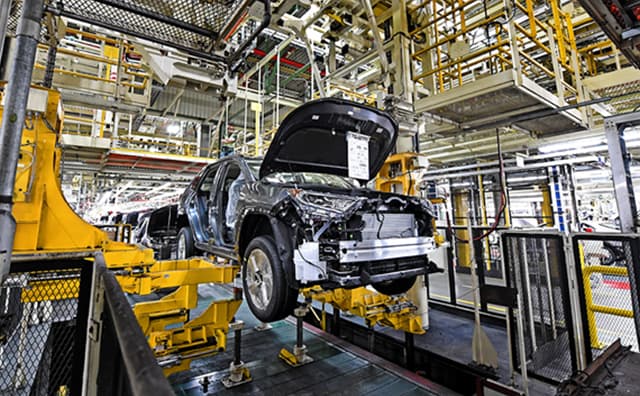Want to know more about how Fujitsu can help you achieve your sustainable transformation?
Toyota’s human-centric journey from automobiles to mobility

Susan Elkington, President of Toyota Motor Manufacturing Kentucky — the Japanese automaker’s largest manufacturing facility in the world — shares her insight on innovation in manufacturing, the importance of purpose, addressing gender imbalance and the transformation of the automobile industry. - by James Lawrence
Toyota Motor Manufacturing Kentucky is not always given the recognition that its sheer size demands. Producing some 550,000 vehicles and 600,000 engines per year in a 9 million sq ft facility (equal to 156 football fields), it is simply the largest global manufacturing facility of the world’s largest automaker.
In charge of that $8 billion plant — which employs more than 10,000 people in the US’s Bluegrass State — is Susan Elkington, who has been the Toyota subsidiary’s President since 2018. Prior to that, she was the first woman in the Japanese company’s history to lead a division at its global headquarters, having been general manager of the production control division at Toyota Motor Corporation’s global HQ, with responsibility for its 53 manufacturing plants worldwide.
The broad experience Elkington has gained on the journey towards her current role, and her vision for the future of the automotive industry, hold valuable lessons for leaders from any business discipline — not least because of the human-centric view she takes of her industry and her purpose-driven approach to leadership.
“When I think about what excites me most about our business, it isn’t the cars — it’s our people,” she says. “To perform at the highest level, you must be passionate about what you do and have a purpose in your work. For my career at Toyota, I found my passion for manufacturing, but it wasn’t until the economic crisis of 2008 [when she’d been with the company for almost a decade] that I discovered my purpose.”
“What excites me most about our business isn’t the cars — it’s our people. To perform at the highest level, you must be passionate about what you do and have a purpose in your work.”
 Susan Elkington, President of Toyota Motor Manufacturing Kentucky
Susan Elkington, President of Toyota Motor Manufacturing Kentucky
She recalls that, while working as Department General Manager at Toyota’s truck plant in neighboring Indiana, the management team had to suspend one of its three manufacturing lines for three months due to a decline in customer demand — and yet, despite some heavy cost-cutting, not a single employee was laid off.
“I was living in my hometown, and I was worried about my family, my co-workers and my community,” she says. “But it was during this difficult time that I found my purpose and realized that my mission was to be part of securing employment for thousands of team members at US plants for generations to come. That drove me to find ways to make a difference in my work and still drives me today.”
550,000
No. of vehicles TMMK produces each year at the world’s largest automobile manufacturing facility
Embracing a technology-led future
This deep-rooted focus on people is also driving Elkington’s vision for the future of the industry, as Toyota, along with its competitors, embraces the likes of connected vehicles, autonomous cars and ‘mobility-as-a-service’ models to transform itself “from an automobile company to a mobility company.”
To achieve this new state, she believes, the company must innovate, with the support of information technology — which requires the right approach from the people she leads. “If we really want to be able to produce the products of the future, we must embrace technology and change the way we produce them,” she says. “We must invest in research and experimentation, at the large company level, but also at our plant level.”
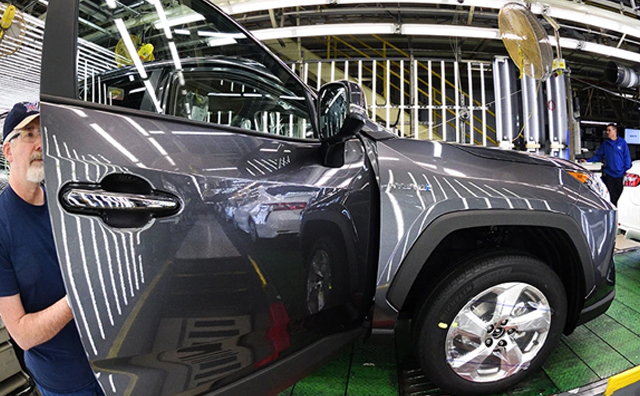 Toyota Motor Manufacturing Kentucky production line for the RAV4 Hybrid
Toyota Motor Manufacturing Kentucky production line for the RAV4 Hybrid
The drive for game-changing innovation will, she adds, inevitably encounter bumps along the road, from which the business must learn. “The biggest failure is not trying,” she says. “So how we respond to failure is so important for a leader. These are the three questions I ask when something occurs, which are the same questions asked to me when I take on risk and initially fail: ‘Can you fix it? What did you learn? And will it ever happen again?’ When you stop and think about it, the amount you can learn will be way greater than what was lost."
By doing this, she argues, the Kentucky plant (which turns out Camry, RAV4 and Avalon models) is able to strengthen its commitment to the Toyota Way, the organization’s deeply embedded philosophy that is centered on its people and a culture of kaizen or continuous improvement. “But this can be only achieved when we focus on the development of the team members and the leaders in the organization,” she stresses. “People always find better ways.”
Addressing the gender imbalance
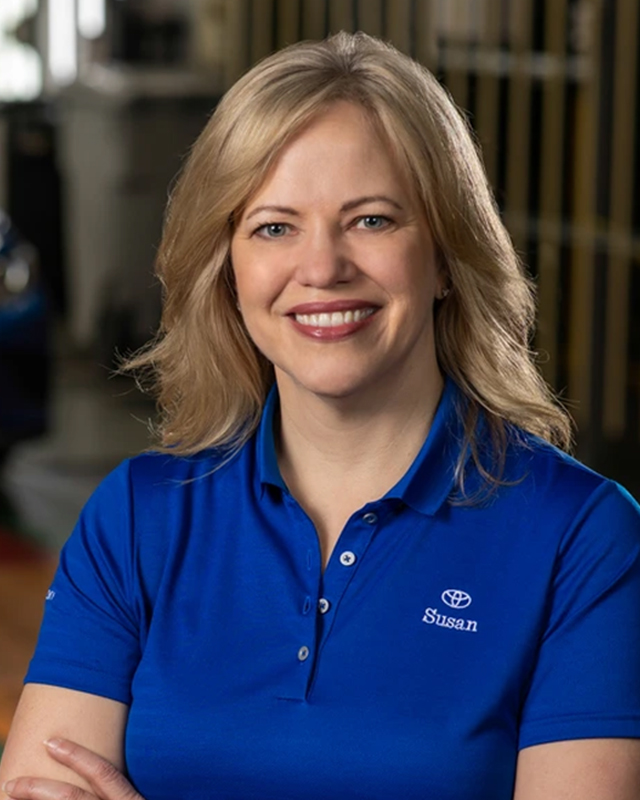 Susan Elkington, President of Toyota Motor Manufacturing Kentucky
Susan Elkington, President of Toyota Motor Manufacturing Kentucky
Elkington’s emphasis on the human aspects of leadership may come as no surprise, given some of her previous experiences. As a female leader in an industry where leadership roles are traditionally dominated by men, she has benefited greatly from mentors.
She recalls how, when she was offered her first management position, she almost turned it down, worried that it would be impossible to juggle the demands of the role with being the mother of two young children.
“I told my VP I didn’t think I could work all the hours, like the other executives,” she says. “But he looked at me and said, ‘I don’t expect you to manage like them, I expect you to lead like you. I am confident you can manage both. Do what is necessary for your family, and if you think you can’t do this at any time, let me know and we’ll work something out.’ And I never had to go to him about it.”
Elkington believes the removal of such barriers is crucial if women are to be better represented at all levels across both her own industry and others. And she sees the automotive industry’s transition towards its digital future as the opportunity to remove another.
“Vehicles today are a combination of hardware and software. You can’t do one without the other — they’re both important — but things are going to get more and more digital,” she says. This, she believes, will lead to design norms being reversed, which in turn could result in the industry becoming a more popular career choice for women. “In the past, you always designed the outside of the car first, and then you did everything else for the vehicle. But I can see that, in the future, you can design the software and what it does, then figure out how to make the shell around it.”
The consequence of such a flip, she argues, represents a chance to instill an important change. “As this shift happens, how can we make people think about our industry differently?” she asks. “If women think it’s automotive, maybe they’re going to continue to shy away from it. But if they see it as technology, maybe not — in technology, in general, we have more females.”
Transforming automotive production
Elkington also sees huge possibilities for the application of digital technology to the manufacturing process. The ability to gather, analyze and react to live data is a great example.
“One key area we’ve been working on is being able to see, in real time, what our customers are buying, then consider how we adapt our factory and our supply chain to that as quickly as possible,” she says.
“Toyota likes to use standardized processes, but our processes for ordering can take too long, so I think it’s going to be truly amazing as we continue to make progress with that.”
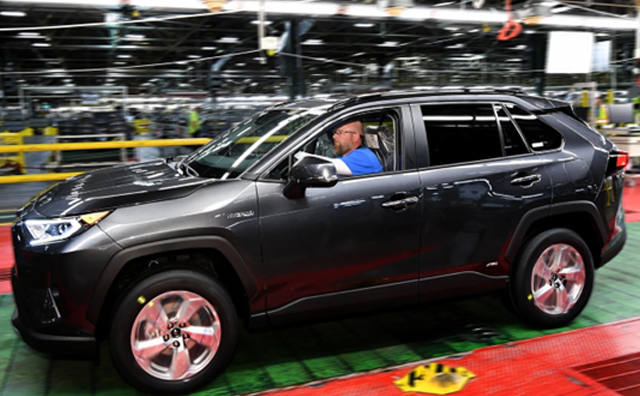 Comerica financial education community
Comerica financial education community
“It isn’t enough just to have a vision and a plan for the future. As leaders, we must also be driven and have the pride and the passion to pursue it.”
What’s more, when even the smallest parts become connected, it will give Toyota the ability to track every item in the manufacturing process on its journey through the factory. This leads Elkington to a key question, closely related to Toyota’s just-in-time production principles: “How do you increase efficiency by tying the receipt of parts to the actual time at which those parts are fitted to a vehicle?”
Such technological challenges, she holds, can rarely be solved without leveraging partnerships to make the best use of third-party knowledge and experience in the face of increasingly rapid change. “More and more, you’re seeing that companies are not trying to do it all because they don’t have the expertise to do so, and they don’t have the timeframe to develop that expertise themselves,” she says. “So I think partnerships are going to be critical.”
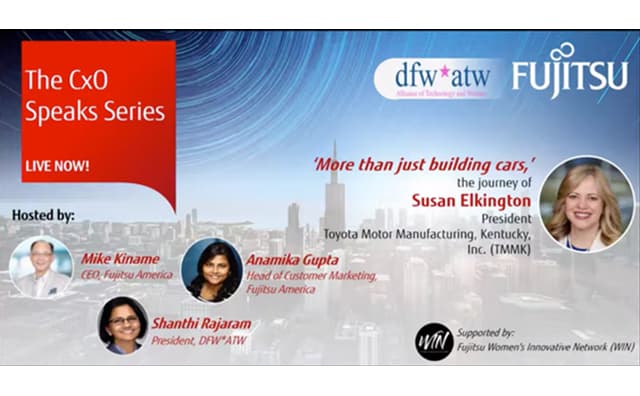 Comerica financial education community
Comerica financial education community
However, the most important ingredients for future success are the personal qualities that help to establish inspirational and transformational leadership, she argues. “It isn’t enough just to have a vision and a plan for the future. As we are leaders, we must also be driven, and we must have the pride and the passion to pursue it,” she says. “I love what I do every day. Every time I start the day at the plant at Toyota Kentucky, I’m excited to tackle the challenges it may bring.”
Watch Toyota Motor Manufacturing Kentucky’s Susan Elkington discussing the transformation of the automobile industry and much, much more as part of the Fujitsu CxO Webinar Series.




